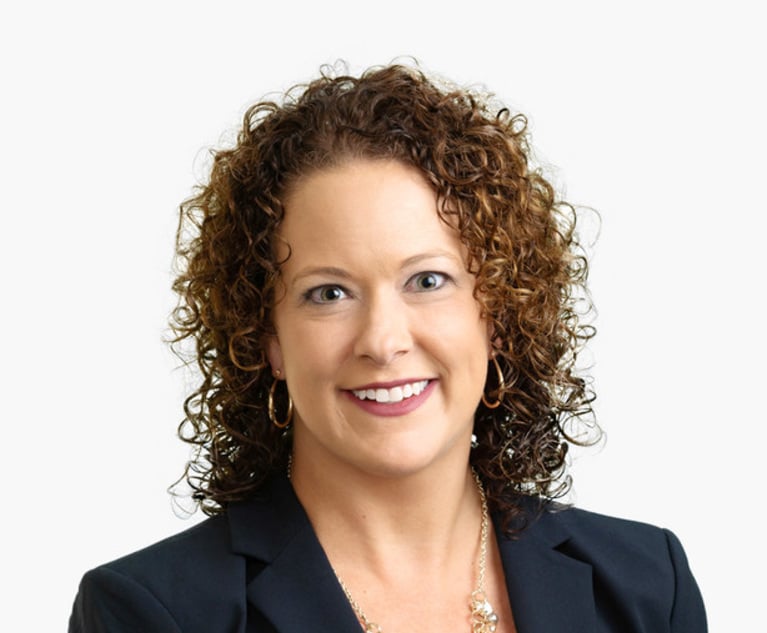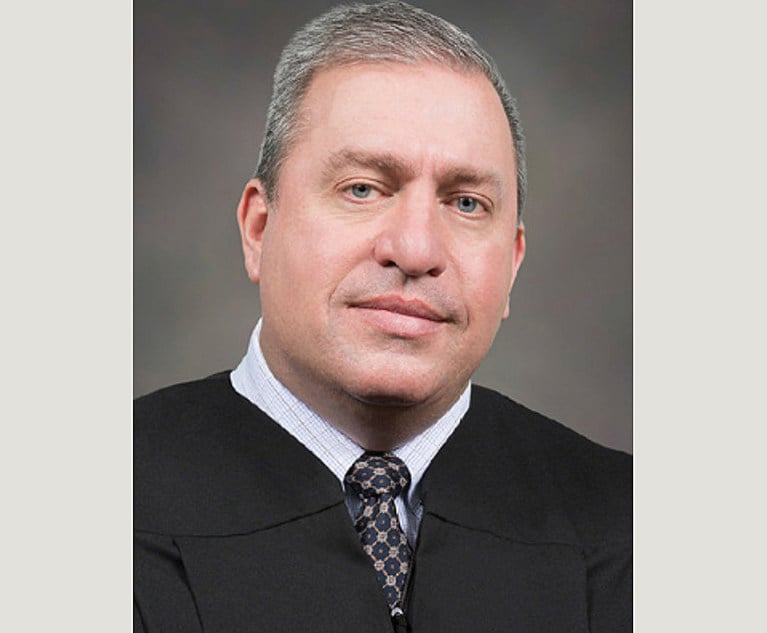 Amanda Green-Hawkins (left) and Daniel McCaffery (right).
Amanda Green-Hawkins (left) and Daniel McCaffery (right).Pa. Superior Court Democratic Contenders Focus on Experience in Candidate Forum
Asked to identify the most pressing problems on the court, Daniel McCaffery responded that he was concerned about the "toxic political climate" surrounding the court, and Amanda Green-Hawkins said her biggest concern was bias in the judicial system.
October 30, 2019 at 04:53 PM
5 minute read
The two Democratic candidates seeking spots on the Pennsylvania Superior Court come from very different legal backgrounds and different regions of the state, but both focused on their experience during a candidate forum Tuesday hosted by Pennsylvanians for Modern Courts.
The hour-long event, which took place at the Central Free Library of Philadelphia, featured candidates Amanda Green-Hawkins, who is associate counsel to the United Steelworkers union, and Philadelphia Court of Common Pleas Judge Daniel McCaffery. Stradley Ronon Stevens & Young attorney Karl Myers moderated the event, posing numerous questions to each candidate about their background, judicial philosophy and process.
Green-Hawkins and McCaffery are running against Megan McCarthy King, a Chester County deputy district attorney, and Cumberland County Court of Common Pleas Judge Christylee Peck, who are both Republicans. Although all four had been scheduled to attend the event, both King and Peck canceled. Peck and King, however, previously participated in a similar forum hosted by Pennsylvanians for Modern Courts in Harrisburg earlier this month, which neither McCaffery nor Green-Hawkins attended.
View the Harrisburg forum with Megan McCarthy King and Christylee Peck here.
Green-Hawkins, who hails from Pittsburgh and got her law degree from Northeastern University School of Law in Boston, focused her opening statements on her background advocating on behalf of "working families and working people."
"The work has been varied. As in-house counsel [I've seen] just about any problem … in any state, in any U.S. territory," she said, adding that her experience often focused on appellate work in both state and federal courts.
During his opening statements, McCaffery, a graduate of Temple University's law school, also focused on his background, growing up in Philadelphia, joining the Army, working in the Philadelphia District Attorney's Office and then, in 2013, becoming a Philadelphia judge.
"Public service is something near and dear to my heart," he said.
McCaffery also said he wanted to specifically run for a spot on the Superior Court because he enjoyed the research he did as a litigator, and he enjoys writing opinions, of which he said he has written around 250. Working on the Superior Court could fulfill a desired "intellectual challenge," he said.
In response to the same question, Green-Hawkins said she wanted to run for a Superior Court judgeship because the court is so often the last stop for litigants in Pennsylvania.
"When someone goes to an attorney for guidance, most of the time, they're going to be guided by decisions from the Superior Court," she said. "It's where my training is. It's what I like to do. It's what I enjoy doing, and because of the impact that can be made on people's lives."
Asked to identify the most pressing problems on the court, McCaffery responded that he was concerned about the "toxic political climate" surrounding the court, and Green-Hawkins said her biggest concern was bias in the judicial system. Biases, she said, need to be recognized and addressed to help ensure people have faith in the system and that they are not denied due process.
McCaffery said that comments from some circles have tended to politicize court functions and undermine public trust in the judiciary.
Green-Hawkins indicated that some voices have been muted by systemic bias.
"Once you start treating people on based on perceptions of who's more or less worthy, you're denying them the ability to be heard," she said.
The notion that courts need to make sure litigants are fully heard and that litigants understand they have been heard in the process was a recurring theme to Green-Hawkins' statements during the forum.
In terms of process, both candidates said research is key when addressing a new area of law.
"There's no substitute for hard work," McCaffery said.
Green-Hawkins added that judges should also rely on their clerks and colleagues to help them make the best possible decisions.
"I see it as a collaborative process, and not that I make a decision, alone, in isolation," she said.
When asked about their one judicial hero from Pennsylvania, both candidates chose judges who they said they admired because of how they treated people, both inside and outside the courtroom. For Green-Hawkins, that person was U.S. District Judge Gary Lancaster of the Western District of Pennsylvania, who she said was a neighbor of hers growing up and treated everyone with "dignity and respect." McCaffery said his judicial hero was Judge Edward Becker, who spent time both on the Eastern District bench and the U.S. Court of Appeals for the Third Circuit, and who, McCaffery said, took time to get to know everyone in the courthouse, from the lawyers to the cleaning staff.
"Nobody was too important, and nobody was not important enough," McCaffery said.
Both candidates are set to appear on the ballot in the Nov. 5 general election.
Read The Legal's Q&As with the candidates:
This content has been archived. It is available through our partners, LexisNexis® and Bloomberg Law.
To view this content, please continue to their sites.
Not a Lexis Subscriber?
Subscribe Now
Not a Bloomberg Law Subscriber?
Subscribe Now
NOT FOR REPRINT
© 2024 ALM Global, LLC, All Rights Reserved. Request academic re-use from www.copyright.com. All other uses, submit a request to [email protected]. For more information visit Asset & Logo Licensing.
You Might Like
View All

Pa. High Court to Weigh Parent Company's Liability for Dissolved Subsidiary's Conduct
3 minute read
Pa. Supreme Court Taps New Philadelphia Family Division Administrative Judge
3 minute read
From 'Confusing Labyrinth' to Speeding 'Roller Coaster': Uncertainty Reigns in Title IX as Litigators Await Second Trump Admin
6 minute readTrending Stories
Who Got The Work
Michael G. Bongiorno, Andrew Scott Dulberg and Elizabeth E. Driscoll from Wilmer Cutler Pickering Hale and Dorr have stepped in to represent Symbotic Inc., an A.I.-enabled technology platform that focuses on increasing supply chain efficiency, and other defendants in a pending shareholder derivative lawsuit. The case, filed Oct. 2 in Massachusetts District Court by the Brown Law Firm on behalf of Stephen Austen, accuses certain officers and directors of misleading investors in regard to Symbotic's potential for margin growth by failing to disclose that the company was not equipped to timely deploy its systems or manage expenses through project delays. The case, assigned to U.S. District Judge Nathaniel M. Gorton, is 1:24-cv-12522, Austen v. Cohen et al.
Who Got The Work
Edmund Polubinski and Marie Killmond of Davis Polk & Wardwell have entered appearances for data platform software development company MongoDB and other defendants in a pending shareholder derivative lawsuit. The action, filed Oct. 7 in New York Southern District Court by the Brown Law Firm, accuses the company's directors and/or officers of falsely expressing confidence in the company’s restructuring of its sales incentive plan and downplaying the severity of decreases in its upfront commitments. The case is 1:24-cv-07594, Roy v. Ittycheria et al.
Who Got The Work
Amy O. Bruchs and Kurt F. Ellison of Michael Best & Friedrich have entered appearances for Epic Systems Corp. in a pending employment discrimination lawsuit. The suit was filed Sept. 7 in Wisconsin Western District Court by Levine Eisberner LLC and Siri & Glimstad on behalf of a project manager who claims that he was wrongfully terminated after applying for a religious exemption to the defendant's COVID-19 vaccine mandate. The case, assigned to U.S. Magistrate Judge Anita Marie Boor, is 3:24-cv-00630, Secker, Nathan v. Epic Systems Corporation.
Who Got The Work
David X. Sullivan, Thomas J. Finn and Gregory A. Hall from McCarter & English have entered appearances for Sunrun Installation Services in a pending civil rights lawsuit. The complaint was filed Sept. 4 in Connecticut District Court by attorney Robert M. Berke on behalf of former employee George Edward Steins, who was arrested and charged with employing an unregistered home improvement salesperson. The complaint alleges that had Sunrun informed the Connecticut Department of Consumer Protection that the plaintiff's employment had ended in 2017 and that he no longer held Sunrun's home improvement contractor license, he would not have been hit with charges, which were dismissed in May 2024. The case, assigned to U.S. District Judge Jeffrey A. Meyer, is 3:24-cv-01423, Steins v. Sunrun, Inc. et al.
Who Got The Work
Greenberg Traurig shareholder Joshua L. Raskin has entered an appearance for boohoo.com UK Ltd. in a pending patent infringement lawsuit. The suit, filed Sept. 3 in Texas Eastern District Court by Rozier Hardt McDonough on behalf of Alto Dynamics, asserts five patents related to an online shopping platform. The case, assigned to U.S. District Judge Rodney Gilstrap, is 2:24-cv-00719, Alto Dynamics, LLC v. boohoo.com UK Limited.
Featured Firms
Law Offices of Gary Martin Hays & Associates, P.C.
(470) 294-1674
Law Offices of Mark E. Salomone
(857) 444-6468
Smith & Hassler
(713) 739-1250





